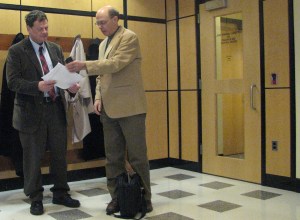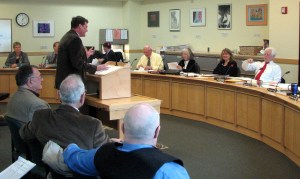AUGUSTA — Superintendents from Lewiston and Oxford Hills school districts told the Education and Cultural Affairs Committee on Wednesday that efforts to pay the required minimum local share of educational costs have placed too great a burden on taxpayers.
Lewiston School Superintendent Bill Webster and Oxford Hills School District Superintendent Rick Colpitts appeared before the committee in the Cross State Office Building to offer two different bills, each intended to find taxpayer relief from the 100 percent local share requirement of the state’s Essential Programs and Services program.
“If I strangle my community in the process we are going backward,” Webster told the 14-member committee.
Webster testified on a bill sponsored by Rep. Michael Carey, D-Lewiston, that would provide a waiver for communities that have a disproportionate high tax burden under the EPS school funding formula.
Colpitts submitted a bill, with the sponsorship of Rep. Jim Hamper, R-Oxford, calling for a permanent waiver of the full funding requirement. He also submitted a compromise bill that would give districts four years to meet the full funding requirement.
Enactment of some sort of compromise measure may be the best Oxford Hills School District can hope for, Colpitts said. He called the full funding requirement “a noose around our neck.”
The two superintendents told the committee they support the EPS requirements as a model to meet state learning standards, but the reality of the funding mandate is harsh.
The Oxford Hills School District is 9 percent below the minimum local share while Lewiston is 6 percent below. State law obligates the state to fund 55 percent of K-12 education, but it only fulfills about 84 percent of that commitment.
Webster is proposing a $58.5 million budget for the fiscal year that begins July 1. The proposed budget would hike property taxes 8.4 percent.
Over the last four years, Colpitts said Oxford Hills’ school budget increases have averaged only 1 percent, while municipal governments have been asked to increase their support of education an average of 11 percent over the same period. Last year, voters approved a $35.1 million budget with an overall 6.03 percent increase in local assessments by not raising the full EPS amount.
“Our community is supportive of education and values the opportunities it affords, particularly in this economically challenged time,” Colpitts testified. “This support does not come without significant sacrifice and challenge.”
Colpitts said that despite double-digit unemployment, significant substance abuse and a districtwide poverty rate of close to 70 percent, 66 percent of SAD 17 residents supported the school budget in the last referendum. The district includes the towns of Harrison, Hebron, Norway, Oxford, Otisfield, Paris, Waterford and West Paris.
Five members of the SAD 17 school board, Chairman Ron Kugell of Oxford, Donald Gouin of Norway, Curtis Cole of Paris, Barry Patrie of Waterford and Jared Cash of Norway, plus Oxford Town Manager Michael Chammings testified for the bill.
Since 2004, Maine has used the Essential Programs and Services model to calculate how much money each school district needs to spend to provide an adequate education. Calculations are based on various factors, including staff-to-pupil ratios, with adjustments for characteristics of the student population and geographic factors.
The state uses property values to determine how much each community should contribute to the EPS amount, and a state subsidy covers the rest. Colpitts testified that even with some flaws, he supports the state’s valuation to determine how much a municipality can contribute to the operation of schools.
Following his testimony, Colpitts said outside of the hearing room that he was doubtful the permanent waiver proposal will pass.
“I’m not optimistic,” he said. His said his hope is that a “ramped up” plan to ease the financial burden over a period of a few years will be enacted.
The Education and Cultural Affairs Committee members are residents of cities and towns that fund 100 percent of the EPS requirement and at least one member expressed concern about “habitual underfunders.“
Both superintendents received good news last week when the supplemental budget for 2013-2014 was approved, including an extension through June 2014 of the waiver requirement that municipalities raise school taxes to fund a minimum level.
If that had not been enacted, Lewiston would be $3 million short and Oxford Hills School District would need another $1.8 million for the next fiscal year.
The committee is expected to review the Lewiston and Oxford Hills School District bills during a work session Thursday, March 21.
ldixon@sunjournal .com


Comments are no longer available on this story